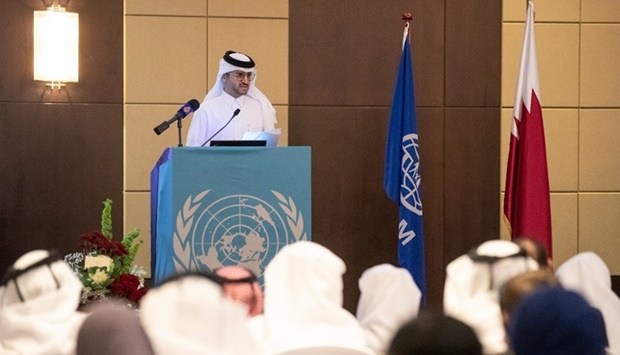To date QR82.35mn has been reimbursed by contractors under the Universal Reimbursement Scheme launched by the Supreme Committee for Delivery & Legacy (SC) to combat the illegal practice of charging workers recruitment fees.
This was announced by the SC Wednesday in a statement about its participation in an event to mark International Migrants Day. Held by the International Organisation of Migration’s mission in Qatar, the event discussed different ways Qatar has successfully implemented the Global Compact for Safe, Orderly and Regular Migration, an international agreement that addresses all aspects of international migration.
The event brought together different stakeholders from Qatar including HE the Minister of Labour Dr Ali bin Saeed bin Smaikh al-Marri, as well as Dr Ahmad Hassan al-Hammadi, secretary general of the Ministry of Foreign Affairs and representatives from the Ministries of Interior, Justice and Public Health.

SC's Universal Reimbursement Scheme is to combat the illegal practice of charging workers recruitment fees
The SC was represented by Mohamed al-Hajri, Compliance and Audit Director of the Workers’ Welfare Department, who shared the SC’s on-going progress and commitment towards workers’ welfare.
He recalled the Universal Reimbursement Scheme as one of SC’s most ground-breaking initiatives. The majority of migrant workers globally, and many in Qatar, have paid recruitment fees, but they are unable to provide any proof – hindering reimbursement by their employers, he said.
“Our solution was to transfer the burden of proof away from the employee and on to the employer through the scheme. As a result, 266 contractors have agreed to reimburse approximately QR103.95mn to 49,286 SC and non-SC workers over a 36-month period. To date, QR82.35mn has been reimbursed, and as a testament of the Qatar 2022 legacy in action, 11 of our contractors have extended this scheme to cover 18,066 non-SC workers,” said al-Hajri.

At the heart of the SC’s work to ensure the rights of migrant workers are the Workers’ Welfare Standards.
"The SC recognises the immense contribution of the migrant workforce in building our world-class stadiums. At the peak of construction, we welcomed over 30,000 migrant workers from across the world, and since day one, we have been working hard to ensure every individual working on our projects is treated with utmost respect and dignity,” he pointed out.
At the heart of the SC’s work to ensure the rights of migrant workers are the Workers’ Welfare Standards, established in 2014. The standards are embedded in the SC tendering process and are contractually binding.
“They protect our workers throughout their time with us – from recruitment to repatriation – covering critical areas such as recruitment and contracts, wages, accommodations, access to remedy, and health and safety,” he said.
During the event, al-Hajri discussed several key initiatives that have been put in place to protect the rights of those migrant workers that have contributed to the delivery of the first FIFA World Cup to take place in the Middle East and Arab world.
At the event, the SC also recognised the importance of worker representation and giving workers a voice, for which it has established a multi-tier grievance mechanisms platform to empower workers and provide them with access to remedy. These include Workers’ Welfare Forums – the SC’s flagship grievance platform, worker interviews as well as a dedicated Grievance Hotline for workers to report issues anonymously.
“The SC introduced Workers’ Welfare Forums, which allow workers to elect representatives to speak on their behalf about any concerns they have without fear of retaliation. Over 113 forums were conducted at peak, covering 23,500 workers. Both the International Labour Organisation and Qatar’s Ministry of Labour have studied the impact of the forums to support the replication of joint worker-employer committees in Qatar, which is yet another testament of the legacy we are building as part of the tournament,” the official said.
Other key Workers’ Welfare initiatives included the introduction comprehensive medical screenings, mental health screenings, an electronic medical record system and the deployment of over 45,000 StayQool suits to address heat stress.
With less than a year to go until the FIFA World Cup, the SC is working to ensure that its Workers’ Welfare Standards extend beyond the construction sector to benefit the workforce employed for tournament-centric services and projects that make up the Host Country Operations for 2022.
“We want to make sure that the work we do in this area leaves a legacy that lasts well beyond the final whistle. Our work is critical in informing the country’s legislation for migrant workers and accelerating its efforts in establishing unprecedented welfare standards and practices in the region’s labour industry,” said al-Hajri.

